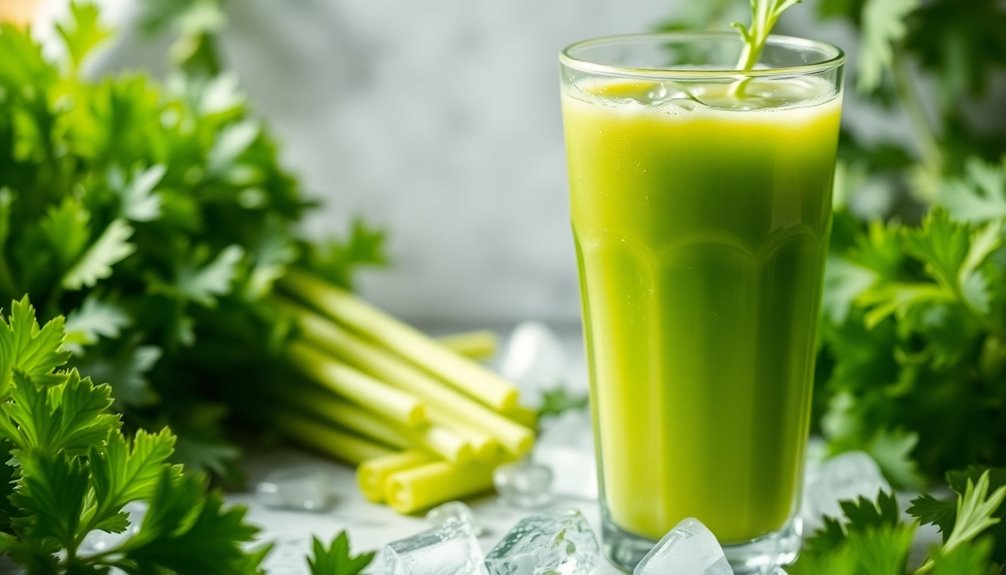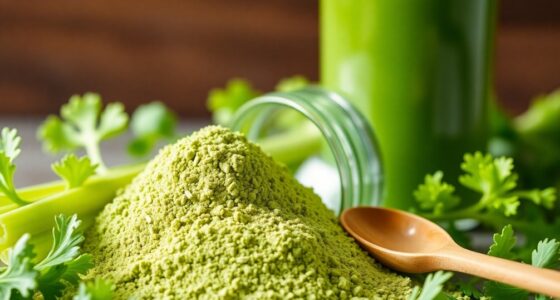Yes, celery juice is a natural diuretic. It promotes increased urine production and aids in flushing out excess fluids and sodium from your body. Packed with potassium, it helps maintain fluid balance and supports kidney health. Plus, its anti-inflammatory properties contribute to overall wellness, while the hydration benefits keep you feeling refreshed. If you're curious about how else celery juice can enhance your health, there's plenty more to uncover about its benefits!
Key Takeaways
- Celery juice acts as a natural diuretic, promoting increased urine production and aiding in fluid and sodium elimination.
- It contains high levels of potassium, which helps balance sodium and supports cardiovascular health.
- With about 95% water content, celery juice enhances hydration and supports kidney function.
- The juice has anti-inflammatory properties, reducing inflammation and oxidative stress in the body.
- Regular consumption may aid in managing fluid retention and promoting overall digestive health.
Understanding Diuretics and Their Benefits
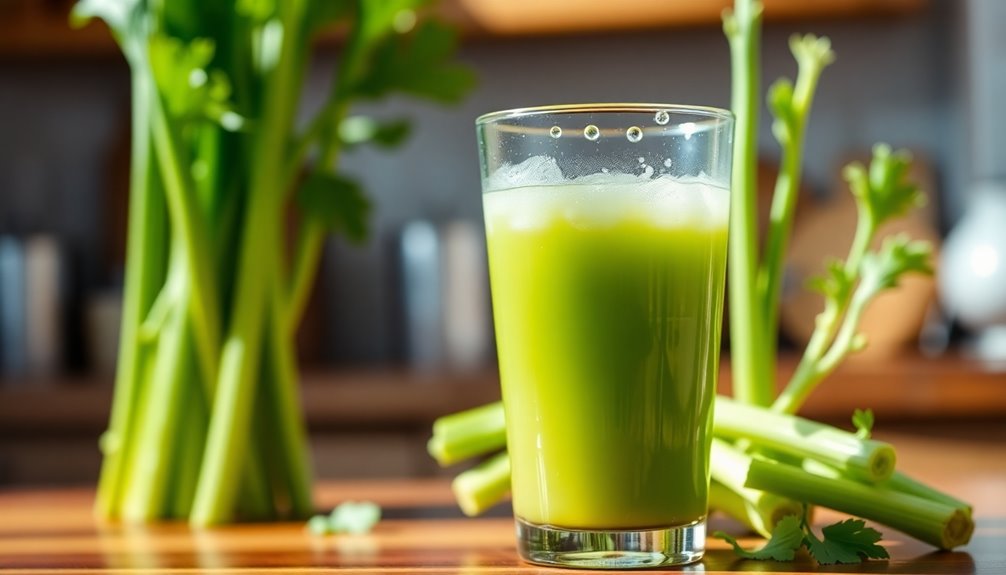
When you think about diuretics, it's essential to understand how they can benefit your health. Diuretics promote increased urine production, helping your body eliminate excess fluid and sodium. This can be especially useful for managing high blood pressure and reducing swelling.
Natural diuretics like celery juice offer additional perks; they contain potassium and phthalides that help relax blood vessel walls. With celery juice being around 95% water, it also hydrates your body while supporting kidney function.
Plus, its potassium content balances sodium levels, enhancing its diuretic effects and promoting cardiovascular health. However, remember to consume celery juice in moderation to avoid potential electrolyte imbalances.
Embracing these health benefits can lead to a more balanced lifestyle.
Nutritional Profile of Celery Juice
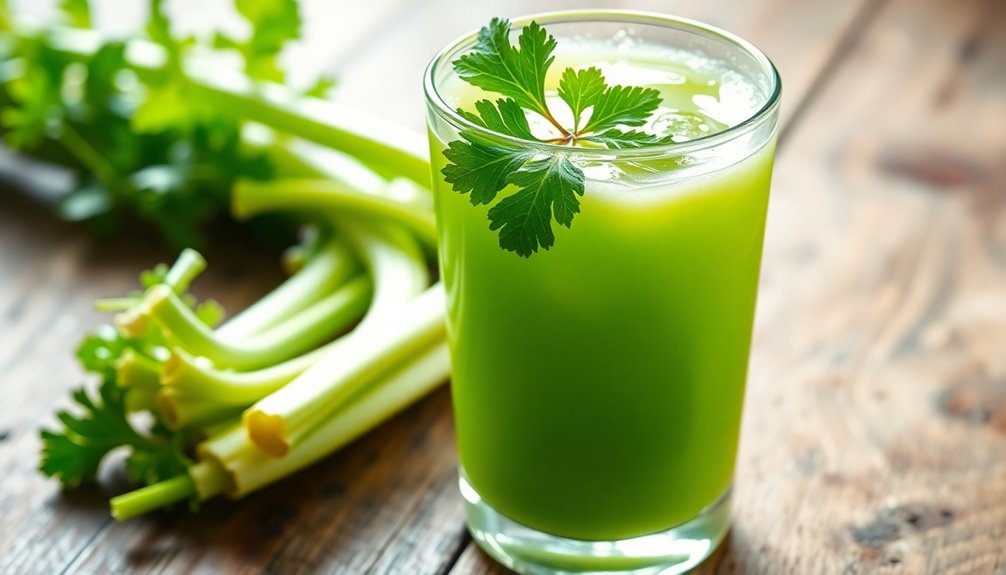
When you consider the nutritional profile of celery juice, you'll find it's a low-calorie drink packed with essential vitamins and minerals.
It's rich in potassium and vitamin K, which can support heart health and bone strength.
Plus, with its hydration benefits and fiber content, celery juice serves as a revitalizing addition to your diet. Additionally, its high water content contributes to hydration support, making it an excellent choice for maintaining fluid balance.
Caloric and Macronutrient Breakdown
Celery juice offers a revitalizing low-calorie option for those looking to stay hydrated without adding excess calories to their diet. With just 50 calories in a 10-ounce serving, it's perfect for your daily routine.
Here's a quick look at its macronutrient breakdown:
- Protein: 2 grams
- Carbohydrates: 9 grams
- Fat: 0.5 grams
Additionally, celery juice is packed with about 5 grams of dietary fiber, promoting digestion and satiety.
Thanks to its high water content of around 95%, it's a fantastic way to boost hydration while keeping caloric intake low.
Enjoy this invigorating drink guilt-free as part of a balanced diet!
Essential Vitamins and Minerals
Beyond its low-calorie appeal and hydration benefits, celery juice is also a powerhouse of essential vitamins and minerals that contribute to overall health.
A 10-ounce serving packs approximately 90 mcg of vitamin K, supporting bone health and blood clotting, while providing 110 mcg of folate, vital for DNA synthesis and cell division.
With 781 mg of potassium, it helps maintain fluid balance and regulate blood pressure. Additionally, you'll find about 10 mg of vitamin C, an antioxidant that bolsters your immune system and promotes skin health.
Though some dietary fiber is lost during juicing, each serving still delivers 5 grams, enhancing the nutritional value and health benefits of celery juice in your diet. Moreover, celery juice can complement a diet rich in dietary fiber, promoting digestive health and regularity.
Hydration and Fiber Content
Although many people overlook the importance of hydration, incorporating celery juice into your diet can greatly enhance your fluid intake. With its impressive composition of approximately 95% water, it helps keep you hydrated and fend off dehydration.
Here's what you'll gain from celery juice:
- Fiber Content: A 10-ounce serving packs about 5 grams, supporting digestive health, although juicing removes some fiber.
- Sodium: With around 189 mg per cup, it's beneficial for those managing sodium levels, especially concerning hydration and blood pressure.
- Overall Nutrients: It provides potassium, vitamin K, and vitamin C, enhancing your overall health. Additionally, the high fiber content in celery juice can contribute to feelings of fullness, similar to how chia seeds aid in reducing hunger.
How Celery Juice Promotes Hydration
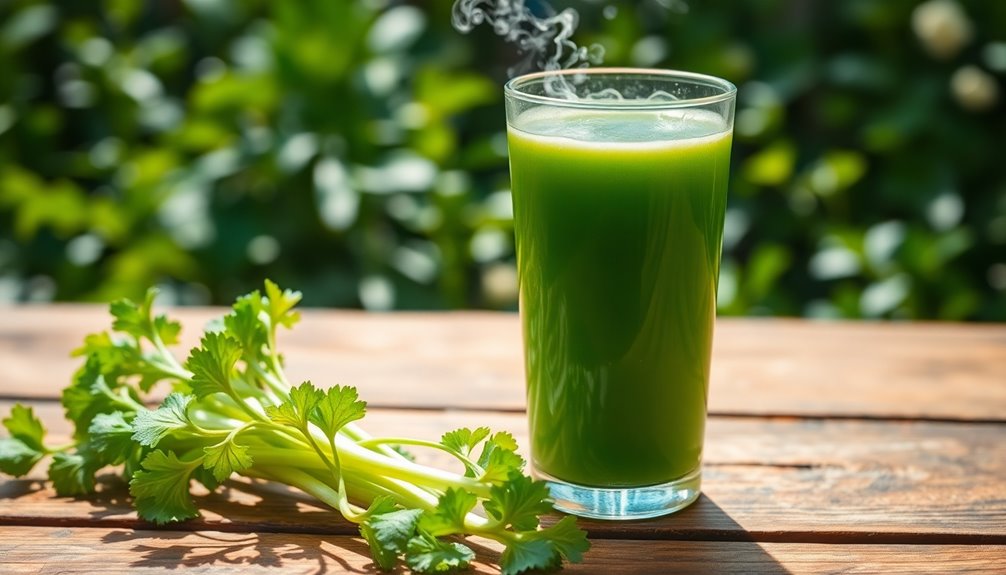
When you sip on celery juice, you're not just enjoying a revitalizing drink; you're also giving your body a powerful hydration boost.
With about 95% water content, celery juice is an excellent source of hydration. A 10-ounce serving delivers around 781 mg of potassium, essential for maintaining fluid balance in your body. This natural electrolyte helps replenish fluids lost during exercise or heat exposure, keeping you refreshed and energized. Additionally, consuming hydrating foods like celery may contribute to lower rates of depression, supporting your overall mental wellness.
Drinking celery juice regularly can also enhance your skin health by ensuring adequate moisture levels and elasticity.
The Role of Potassium in Kidney Health
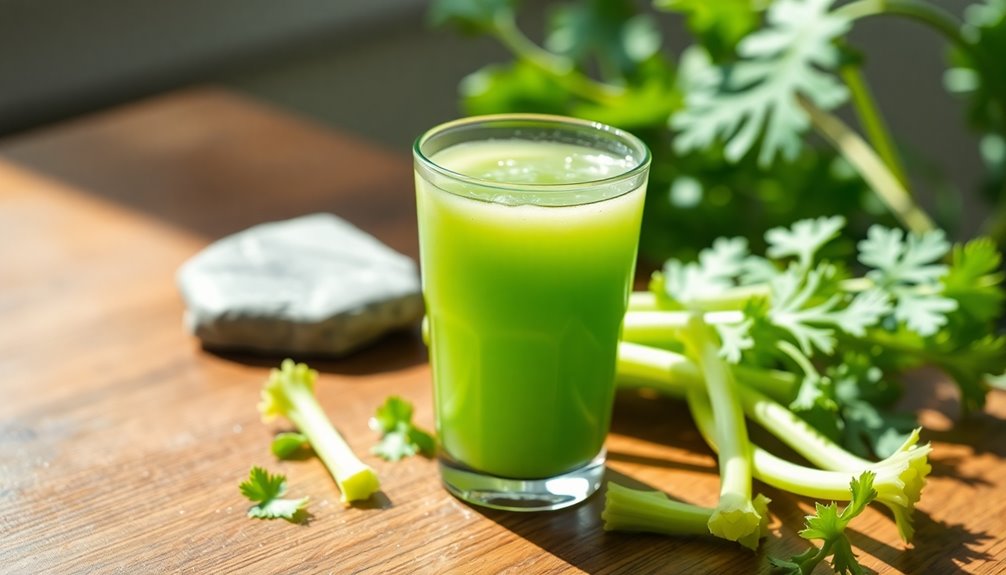
Celery juice not only keeps you hydrated but also offers significant benefits for kidney health, primarily through its potassium content. This essential mineral plays a crucial role in regulating fluid balance and maintaining ideal blood pressure, which reduces strain on your kidneys.
Including potassium-rich foods like celery juice can provide several advantages for your kidney health:
- It helps prevent kidney stones by lowering calcium excretion in urine.
- Adequate potassium intake supports your kidneys in effectively filtering waste from the blood.
- A balanced potassium intake can protect against chronic kidney disease by countering high sodium levels.
- Additionally, tax implications of Gold IRAs can also affect your overall financial health, allowing for better investment in nutrient-rich foods.
With about 625 mg of potassium per cup, celery juice is a fantastic addition to your diet for better kidney function.
Anti-Inflammatory and Antioxidant Properties
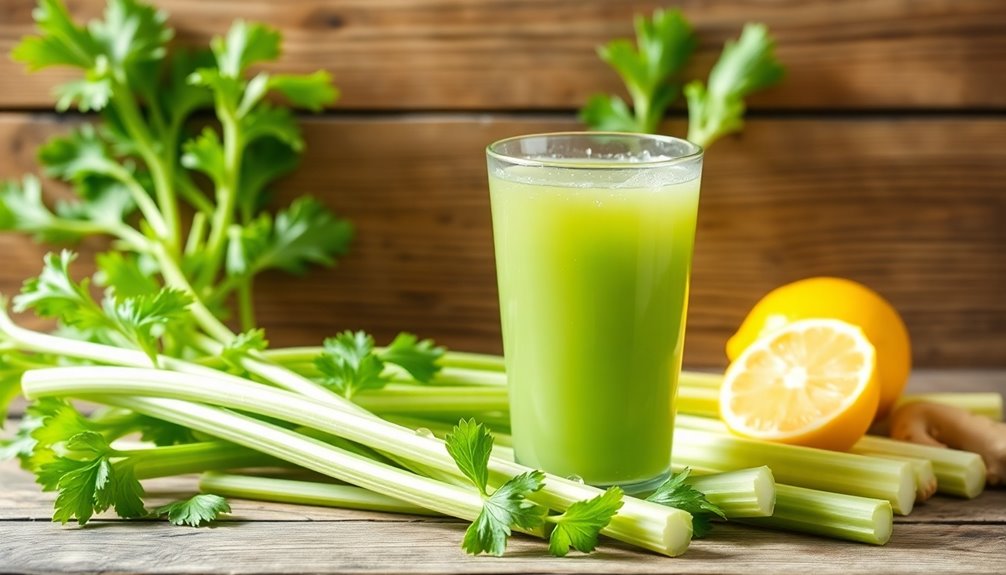
When you drink celery juice, you're tapping into powerful anti-inflammatory and antioxidant benefits.
Luteolin, a key phytonutrient, helps reduce inflammation and may even ease conditions like arthritis.
Plus, the antioxidants in celery juice fight oxidative stress, potentially lowering your risk of chronic diseases related to inflammation.
Luteolin's Role in Inflammation
Luteolin, a powerful flavonoid found in celery, plays an essential role in combating inflammation and oxidative stress. Its anti-inflammatory and antioxidant properties can be particularly beneficial for your health.
Here's how luteolin can make a difference:
- Reduces inflammation: Luteolin helps manage conditions like asthma and arthritis by suppressing inflammatory responses.
- Neutralizes free radicals: As an antioxidant, it protects your cells from oxidative stress linked to chronic illnesses.
- Inhibits cytokines: Luteolin disrupts the production of pro-inflammatory cytokines, reducing immune signaling that triggers inflammation. Additionally, aromatherapy can stimulate the limbic system, which may complement the anti-inflammatory effects of luteolin through its ability to enhance emotional well-being.
Antioxidants and Chronic Diseases
Antioxidants play a significant role in reducing inflammation and preventing chronic diseases. Celery juice is packed with antioxidants like apigenin and luteolin, which help combat inflammation and lower the risk of conditions such as arthritis and heart disease. These phytonutrients also support cardiovascular health by managing blood pressure.
Here's a quick overview of how antioxidants in celery juice impact chronic diseases:
| Antioxidant | Benefit | Related Chronic Disease |
|---|---|---|
| Apigenin | Reduces inflammation | Arthritis |
| Luteolin | Inhibits cancer cell growth | Cancer |
| Potassium | Lowers blood pressure | Heart disease |
| Overall | Protects against oxidative stress | Diabetes |
Incorporating celery juice into your diet can be a powerful step toward better health! Additionally, the anti-inflammatory properties of turmeric can further enhance the benefits of celery juice for managing chronic inflammation.
Potential Effects on Blood Pressure and Cholesterol
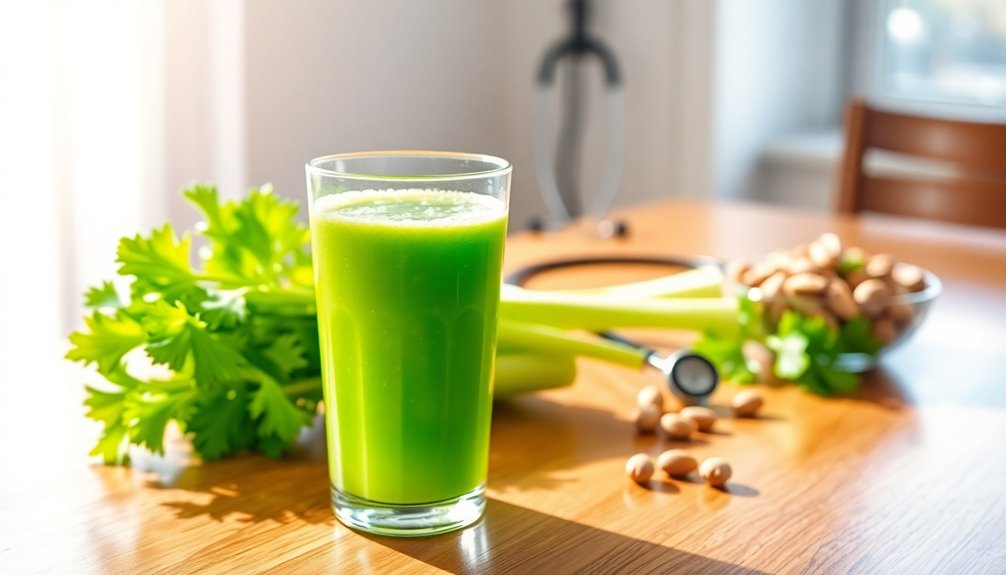
Celery juice offers several potential benefits for blood pressure and cholesterol levels, thanks to its unique compounds. Here are some key effects you might experience:
- Lower Blood Pressure: Phthalides in celery juice help relax arterial walls, potentially leading to reduced blood pressure levels.
- Cholesterol Management: Regular consumption may help lower cholesterol, positively impacting your lipid profile.
- Anti-Inflammatory Properties: Antioxidants like apigenin and luteolin help reduce inflammation, which is linked to better cardiovascular health.
With about 625 mg of potassium per serving, celery juice supports blood pressure regulation.
Plus, its high water content keeps you hydrated, essential for ideal blood pressure and overall cardiovascular function. Additionally, the inclusion of natural remedies alongside dietary changes can further enhance your heart health.
Incorporating this invigorating juice into your routine might just be a smart move for your heart health!
Celery Juice and Digestive Support
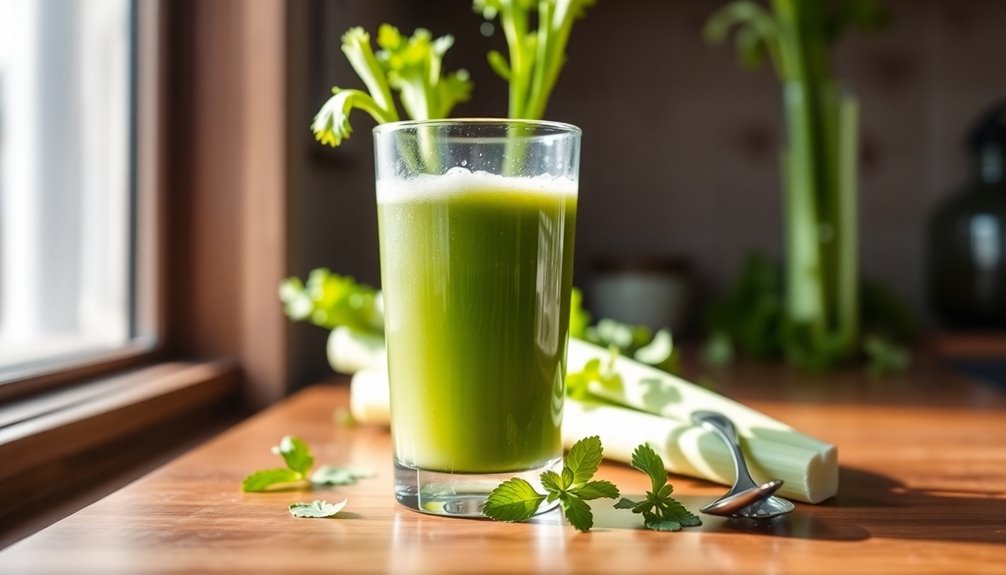
While many people turn to various remedies for digestive support, incorporating celery juice into your routine can be an invigorating and beneficial choice.
With about 95% water content, celery juice offers excellent hydration, which is essential for digestive health. The luteolin in celery juice may help reduce gut inflammation, contributing to smoother digestion.
Although strained juice has less fiber, it still provides some benefits for promoting regular bowel movements. Plus, with around 625 mg of potassium per cup, celery juice helps balance electrolytes, supporting healthy digestion.
Safety Considerations and Allergies
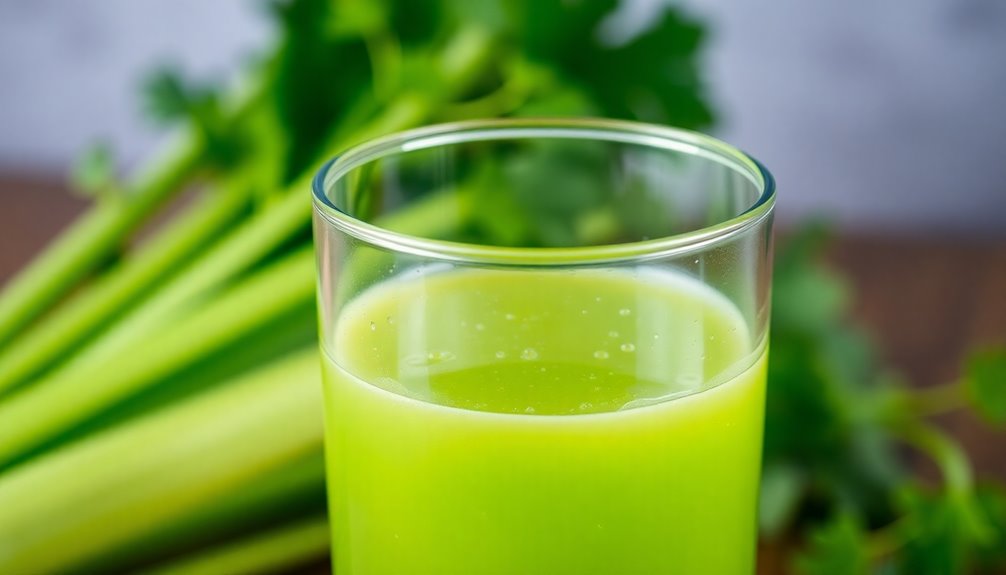
When adding celery juice to your diet for its digestive benefits, it's important to contemplate safety aspects, especially if you have specific health concerns or allergies.
Here are key safety considerations to keep in mind:
- Celery Allergies: If you're allergic, you might face severe reactions like respiratory issues or skin rashes. Anaphylaxis is a risk for sensitive individuals.
- Medication Interactions: Celery juice contains vitamin K, which can interfere with blood thinners. Always consult a healthcare professional if you're on such medications.
- Sun Sensitivity: Celery contains psoralen, increasing skin sensitivity to sunlight. Take precautions after consumption to avoid sunburn.
- Nutritional Balance: It's essential to ensure that your overall diet remains nutritional balance to support your health when incorporating new foods like celery juice.
Incorporating Celery Juice Into Your Diet

Incorporating celery juice into your diet can be a rejuvenating way to boost hydration and support your urinary health. This nutrient-rich drink provides about 781 mg of potassium per serving, promoting kidney function and balancing sodium levels. Drinking celery juice regularly can help manage fluid retention without the harsh effects of synthetic diuretics. Additionally, celery juice has anti-inflammatory properties, which can further enhance overall wellness.
Here's how to enjoy celery juice:
| Serving Suggestions | Benefits |
|---|---|
| Morning juice with breakfast | Enhances hydration |
| Pre-workout drink | Boosts energy and nutrient intake |
| Mixed with other juices | Adds flavor and nutrients |
Pair it with a balanced diet filled with fruits and vegetables to maximize its hydration and nutrient benefits. Enjoy the invigorating taste while supporting your health!
Frequently Asked Questions
What Is the Truth About Drinking Celery Juice Daily?
Drinking celery juice daily can offer several health benefits.
It's packed with water, helping you stay hydrated, while its sodium and potassium levels may support kidney function.
You'll find that it contains compounds that might improve circulation, too.
However, it's important to enjoy it as part of a balanced diet, rather than relying on it for detoxification or fluid retention treatment.
Moderation is key, especially if you're monitoring your sodium intake.
Does Celery Have a Diuretic Effect?
You might think celery's just a crunchy snack, but it packs a surprising punch.
Yes, celery does have a diuretic effect, thanks to its high water content and potassium levels. When you drink celery juice, your kidneys may excrete excess water, helping you stay balanced.
However, remember it’s not a replacement for prescribed diuretics. Incorporate it into your diet, and you could enjoy the benefits without overdoing it! Many people find that incorporating cranberries into their meals or enjoying cranberry juice can enhance their hydration and help with natural detoxification. It’s essential to monitor your body’s response and consult a healthcare professional if you have any concerns about using cranberry juice as a diuretic. By doing so, you can maximize the advantages while ensuring it complements any prescribed treatments you may be following.
Does Celery Juice Help With Fluid Retention?
Celery juice can help with fluid retention due to its high water content and potassium levels.
When you drink it, the potassium may counterbalance sodium's effects, promoting better fluid balance in your body.
Additionally, the natural compounds in celery juice might assist your kidneys in regulating fluid levels effectively.
Does Celery Juice Increase Urination?
Yes, celery juice can increase urination. With its high water content and sodium levels, it may lead to more frequent trips to the bathroom.
The potassium and phthalides in celery can promote kidney function, potentially enhancing its mild diuretic effects.
However, individual responses can vary, so it's best to enjoy celery juice as part of a balanced diet rather than relying on it solely for increased urination.
Conclusion
Incorporating celery juice into your diet offers a rejuvenating way to boost hydration and support kidney health while reaping its anti-inflammatory benefits. Remember, "an ounce of prevention is worth a pound of cure." By enjoying celery juice regularly, you can promote overall wellness and potentially manage blood pressure and cholesterol levels. Just be mindful of any allergies and start with moderation. Cheers to a healthier you with this vibrant green elixir!
Cindy thoroughly researches juicing trends, techniques, and recipes to provide readers with practical advice and inspiration. Her writing style is accessible, engaging, and designed to make complex concepts easy to understand. Cindy’s dedication to promoting the advantages of juicing shines through her work, empowering readers to make positive changes in their lives through the simple act of juicing.

